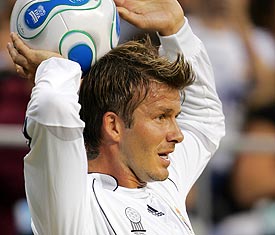 I know the whole Beckham affair is "old news" by now. But what better topic is there for an European to write on an American Sports Law blog than the David Beckham $250M move from Real Madrid to the Los Angeles Galaxy? I think the issue is interesting for a number of reasons.
I know the whole Beckham affair is "old news" by now. But what better topic is there for an European to write on an American Sports Law blog than the David Beckham $250M move from Real Madrid to the Los Angeles Galaxy? I think the issue is interesting for a number of reasons.First and foremost, after the likes of Pelé, Beckenbauer and our very own Eusébio were lured to the NASL in the 70's, the MLS has finally made itself available to the games' truly big names. Although overexpansion is a well documented cause for the failure of the NASL, the hiring of older, high profile foreign players, has been highlighted as the defining motive for the fiasco. The effort to bring in foreign "stars" placed an excessive strain on the league's finances. And for all their stardom, these players failed to elevate the game to levels of financial sustainability in the United States. After the implementation of the Designated Player Rule last November, it was only a matter of time before something like this happened. Future prospects for the game are buoyant with increasing media coverage and greater deals being signed and a city like LA will make the business qualities of the Beckhams (Posh included) all the more attractive. At 32, Becks still has a couple of years left in him. And considering he has never played the game as well as he sells it, the Galaxy franchise is not being conned. It is actually getting excellent value for its money. As for the greater good of the League, one has to admit that with a sound college system feeding the main division, and on the basis of the consistent showings by the US National Team, the time is right for the inception of the Designated Player Rule. If the game is to be taken to the next level, Becks and Co. are just the ones to do it.
It will also be interesting to see how other MLS major stars react to Becks' arrival. On $900,000 per year, Landon Donovan, one of the most recognizable faces in the LA soccer scene, is certain to undertake a reassessment of his career. Sportsmen tend to relate their salary with their on-field performance and their potential to deliver the goods, past statistics, etc. Marketability is not nearly as rated by players as it is by managers when it comes to salary assessment. Beckham could be just as good as Pelé - which he is not - and the salary gap would still be virtually indefensible from a player's perspective. There is definite potential for the clash of egos in future editions of the League.
Finally, the spotlight once again falls upon the exceptions to salary cap mechanisms which have featured prominently in past MLB, NBA, NFL and NHL negotiations. As a matter of principle, an exception undermines the goal of competitive balance which is purportedly pursued by a salary cap system, because it allows richer clubs the chance to exert their financial domination by acquiring the services of the most talented players. However, smart management and clever allocation of central contracts and high levels of revenue sharing should control the damage potentially arising from this specific exception. On this matter, the ability to swap a designated player for draft picks could be the catalyst that perpetuates differences between high revenue and low revenue teams. Let's see if restraining Designated Players to two per team will be enough.
One final note: Europeans would do well to look at the Beckham Exception (could this be the new name for the Designated Player Rule...?). Salary Cap systems need to be flexible in order to accommodate labor and anti-trust considerations. Revenue sharing is the underlying element that facilitates cap systems in the American professional leagues. Revenue Sharing in Europe has only now started to come to life and is still incipient. The "Arnaut Report" (named after a Portuguese former Minister) insists that caps should be put in place in European Leagues, in order to curb the financial excesses of most of our clubs. Many arguments can be put forth here, but mine is one of principle: without effective revenue sharing, caps do not work and can even exacerbate the differences between high and low revenue clubs. Are we, Europeans, getting ahead of ourselves?





0 comments:
Post a Comment